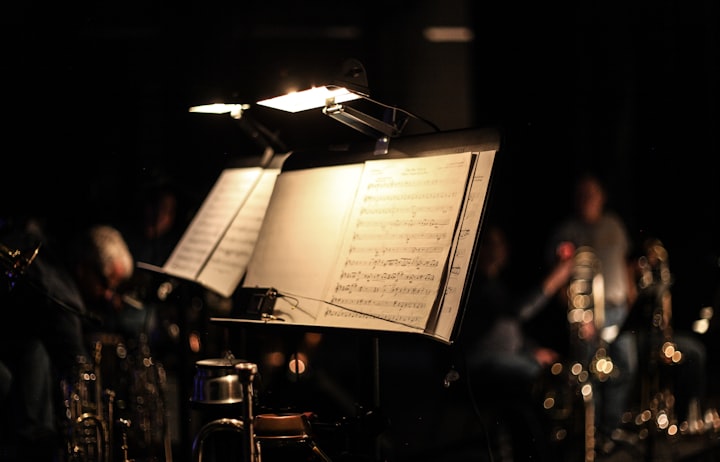The Lost Symphony: A Conductor's Quest
Unraveling the mystery of a forgotten masterpiece and the composer who vanished without a trace

In the heart of Vienna, a city renowned for its profound musical heritage, young conductor Franz lived a life steeped in rhythm and melody. As the lead conductor at the illustrious Vienna Philharmonic, he had the privilege of directing some of the finest musicians in the world, breathing life into works by Mozart, Beethoven, and other greats. But despite the prestige and satisfaction his job offered, he often found himself yearning for something more - a musical endeavor that was entirely his own.
This unfulfilled desire led him to spend countless hours in Vienna's ancient music library, poring over compositions old and new, famous and obscure. It was on one such afternoon, as the autumn sun painted long shadows on the library's wooden floors, that he stumbled upon a peculiar piece of music. Tucked away in a corner that seemed forgotten by time, a yellowed, dust-covered music score caught his eye.
The composition was a symphony, yet unlike any he had encountered before. Its notes, though smudged with age, wove a melody so profound it resonated within Franz's very soul. The composer's name, frustratingly, was smeared beyond recognition. The only discernible writing was the title of the piece, "Die verlorene Symphonie."
The symphony's melody seeped into his thoughts and dreams. Its mysterious origin added an allure that Franz couldn't resist. Who had composed this magnificent piece? Why was it cast aside, its brilliance concealed in the dusty corners of the library? An insatiable curiosity took hold of him, setting him on a quest to unearth the symphony's forgotten history.
Franz's first destination was Salzburg, known for its rich musical culture. The city, with its cobbled streets and baroque architecture, was a haven for music lovers, and Franz felt a sense of belonging as he walked its paths. His objective was to meet an elderly music teacher, renowned for his vast knowledge of lost and forgotten music.
Upon hearing the first few bars of "Die verlorene Symphonie," the old teacher's eyes lit up with recognition. He directed Franz to an obscure music archive, where a collection of personal letters from various composers was stored. Among these letters, Franz discovered one from a struggling composer named Erik, who hinted at a grand symphony he was working on - a masterpiece that would define his legacy.
Franz felt a jolt of excitement. Could Erik be the composer of the forgotten symphony? The dates certainly matched, and the mention of a 'masterpiece' seemed more than coincidental. But to be certain, Franz knew he had to learn more about Erik.
His search led him to a small hamlet nestled amidst the Austrian Alps. It was the last known residence of Erik. There, he met an old woman, Elise, who was Erik's last living relative. She welcomed Franz warmly, her eyes misting over with tears as he spoke about the symphony.
Elise revealed the tragic tale of Erik's life. A prodigious talent, Erik composed music that was ahead of his time. However, his innovative style was not appreciated in an era that favored classical traditions. Erik's dreams of fame and recognition were shattered as he languished in obscurity. His life was marked by poverty and hardship, and he disappeared one cold winter night, leaving behind only the unfinished symphony.
Franz was deeply moved by Erik's tragic tale. It stirred something within him, a potent mix of sadness for the forgotten composer and determination to bring his masterpiece to light. Franz made a decision then and there - he would complete Erik's symphony and perform it, ensuring that Erik's genius was finally recognized.
But the task was not easy. Erik's unique style, a blend of classical and folk elements with a touch of the avant-garde, was difficult to replicate. Moreover, Franz was keen on maintaining the authenticity of the symphony, which meant he had to understand Erik's thoughts and feelings when he composed the music.
For the next several years, Franz dedicated himself to completing "Die verlorene Symphonie." He immersed himself in Erik's life and music, traveling to places Erik had lived, meeting people who had known him, even studying other compositions Erik had created. He wanted to understand Erik's unique style, his creative process, and most importantly, the emotions that fuelled his music.
Franz painstakingly worked on the symphony, nurturing it like a gardener tending to a delicate plant. He spent countless hours deciphering Erik's notes, experimenting with different arrangements, and adding his own touches while preserving Erik's style. There were moments of frustration and despair, but also moments of profound joy and fulfillment.
Finally, after years of painstaking work, the symphony was complete. It was a perfect blend of Erik's genius and Franz's dedication, a melody that sang of life's trials and triumphs. It was everything Franz had hoped it would be, and more.
The night of the performance arrived. The Vienna Philharmonic was packed, the air buzzing with anticipation. As Franz walked onto the stage, he felt a rush of emotions. He was about to share a piece of music that had consumed years of his life, a piece of music that told a story of forgotten genius, of a quest, and of a journey that had changed his life.
He raised his baton, and the music flowed, filling the hall with the hauntingly beautiful melody of the lost symphony. It was a triumphant moment, a celebration of music, of history, and of the indomitable human spirit. As the final notes faded, the audience erupted into thunderous applause.
Franz bowed, tears prickling his eyes. His thoughts were with Erik, the forgotten composer whose music had finally found its rightful place in the world. His journey had not just uncovered a lost symphony; it had revealed a path to his own self-discovery.
Through Erik's music, Franz had found his purpose and passion. He realized that music wasn't just a series of notes and melodies. It was a testament to the human spirit, a melody that weaves stories, emotions, and lives together. And with this realization, he knew that his journey was only just beginning.
About the Creator
Evan Brown
Adventurer at heart, writer by trade. Exploring life's complexities through humor, controversy, and raw honesty. Join me on my journey to unlock the extraordinary in the everyday.






Comments
There are no comments for this story
Be the first to respond and start the conversation.